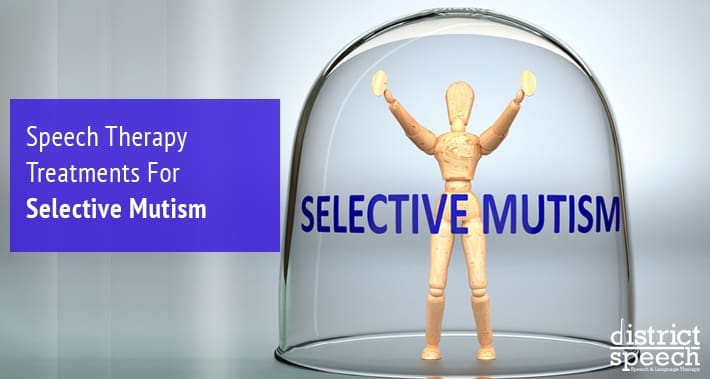
If your child has selective mutism, you’re probably already aware of how much of a puzzling speech disorder it can be.
Why are they completely comfortable speaking in certain situations, but entirely unable to speak in others?
Selective mutism doesn’t just affect children, but also adults.
Typically, though, it first appears during childhood.
If your child experiences selective mutism, it’s important to start speech therapy as early as possible.
Early intervention can give your child the best chance of overcoming their selective mutism.
It is important to note that while it is considered a speech condition, working collaboratively with a psychologist is highly recommended.
At District Speech, we offer children’s speech therapy treatments for selective mutism.
Our experienced speech-language pathologists in Washington can help your child approach communication in all situations with more confidence.
But what is selective mutism, exactly?
And how can our speech therapists help?
Let’s take a closer look.
What Is Selective Mutism?
Selective mutism occurs when your child is able to speak in particular times and places, but not others.
You might notice that your child can speak in places where they feel most comfortable, like at home or with their friends.
However, they may struggle with communication in other environments, such as school or in their community.
Selective mutism can begin at various stages in childhood.
Some children experience selective mutism from a young age.
For other children, it may not start until they go back to school.
Selective mutism doesn’t commonly develop in adults, but it is possible to experience in adulthood if it isn’t addressed in childhood.
If selective mutism persists into adulthood, some adults may need speech therapy to help.
It’s important to note that there’s a difference between being unable and being unwilling to speak.
For those with selective mutism, it’s the former.
Your child may want to speak, but are literally incapable of doing so.
What Are The Signs Of Selective Mutism?
If your child has selective mutism, you will notice that they cannot speak at times when they should be able to.
A common example of this is if your child does not speak during school, but can speak at home.
It’s worth noting that this behavior must last for at least one month to be considered selective mutism.
If your child is new to school, you might want to observe for more than a month.
Sometimes it takes children, especially shy ones, more time to warm up to a new environment.
However, if it persists, it may be that your child has selective mutism.
It’s important to address selective mutism as soon as possible with a speech therapist.
This will help your child’s speech develop more quickly in all situations and keep them on pace with their peers.
It will especially help their social communication, which may lag behind if they can’t speak in social situations.
Some compare selective mutism as similar to a bad case of stage fright.
Both stage fright and selective mutism trigger a freeze response and feelings of panic.
However, if you find that your child is able to speak normally, but not in front of a crowd or present to their class, this isn’t selective mutism.
This is most likely just normal stage fright.
However, public speaking is still something a speech therapist can help your child with.
Similarly, if your child speaks multiple languages, it’s important to make sure your child does in fact understand the language being used.
Not speaking as a result of not knowing the language is not selective mutism.
RELATED: When Should I Take My Child To An SLP?
What Causes Selective Mutism?
There is no known definitive cause of selective mutism.
The Diagnostic and Statistical Manual of Mental Disorders (DSM-5) explains that a child with selective mutism may also have any of the following contributing factors:
- An anxiety disorder
- Extreme shyness
- Desire for solitude
- Speaking very little
- Fear of expressing themselves

How Can A Speech Therapist Help With Selective Mutism?
Speaking with your doctor is the first step if you’re concerned about your child’s speaking ability.
Typically, your child should see both a psychologist and a speech therapist for selective mutism.
This is because the psychologist will check to see if there is an accompanying condition, like anxiety, that is impacting your child’s speaking ability.
Your pediatric speech therapist will test your child’s speech and language abilities.
It’s important to know that speech therapy can also improve your child’s mental health by improving their confidence and ability to communicate.
Together, these professionals will offer the best solution to improve your child’s speaking ability.
They may also work with your family and your child’s school teacher if selective mutism is affecting their studies.
In addition, you may expect your speech therapist to:
- Examine your child’s development and medical history
- Examine how well your child’s lips, jaw, and tongue move
- Examine your child’s understanding of language
- Recommend your child be screened for hearing loss
- Listen to how well your child says words, answers questions, and communicates their ideas
Your child’s selective mutism may trigger when they’re with their speech therapist and not actually be able to speak with them.
If that happens, your speech therapist may ask you to take videos of your child speaking and use those to analyze their patterns.
This is because selective mutism will manifest differently in each person and therefore each child with selective mutism will have to work on different skills.
At District Speech, we also offer speech teletherapy options, so your child can work with a speech therapist from the comfort of their own home.
The goal is to get your child comfortable speaking in all situations.
In order to do this, your child may have to focus on changing their behavior during situations when they typically wouldn’t speak or they may need to focus on their speech and language.
Some tactics that speech therapists may use to change your child’s behavior include:
1. Stimulus Fading
Stimulus fading involves first creating a situation with your child and someone they are already comfortable speaking with.
Then, a new person is slowly introduced in order to get your child comfortable speaking with new people.
2. Shaping
Shaping involves your speech therapist praising and rewarding your child as they try to communicate.
Often, your child will begin with alternative communication, like pointing or gestures.
They will eventually progress towards whispering or mouthing words, finally culminating in speaking as the ultimate goal.
3. Self Modeling Technique
The self modeling technique will have your child watch videos of themselves speaking in a comfortable situation.
Through this process, they can build their confidence regarding how they speak.
Again, the goal is to build confidence so that your child will speak in all appropriate situations.
4. Other Strategies
Your speech therapist will also work with your child on any speech or language challenges they may have.
Some exercises for this include:
- Practicing speaking clearly
- Teaching your child how to say words loudly
- Encouraging your child to ask questions or explain their thoughts using words
Your child will be more comfortable speaking in many situations if they are confident and comfortable with how they sound.
Book Your Appointment With District Speech Today
As you can see, speech therapy is a great resource to help with selective mutism.
The earlier your child is able to start speech therapy, the greater the chances for success because selective mutism can persist into adulthood if left unchecked.
This will impact their education, work potential, and even friendships.
Book an appointment today with District Speech to get started and schedule an evaluation with one of our licensed therapists in DC.
We look forward to working with you.
Book your appointment with District Speech today.
1300 I St NW, Suite 400 E,
Washington, DC 20005
- https://g.page/districtspeech
District Speech and Language Therapy specializes in speech therapy, physical therapy, and occupational therapy solutions, for both children and adults, in the Washington D.C and the Arlington Virginia areas.